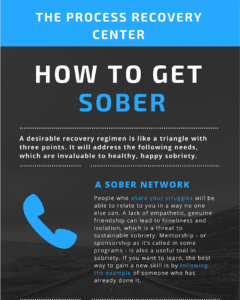“How to get sober?” In the addiction treatment world, it’s one of the most frequently asked questions, but it’s also one that doesn’t have a cut and dry answer. In fact, if you walk into your local book store, you’ll likely find innumerable titles dedicated to recovery and sobriety. The truth is that there are many pathways to sobriety. Each path typically has its own support system and guidelines. AA, NA, SMART Recovery, Refuge Recovery, and Three Principles are among dozens of examples.
At the Process Recovery Center, we encourage our clients to choose their own pathway. It’s not about which pathway you choose; success lies in whether or not you make a choice and then take consistent action in pursuit of your choice. You can possess a library of knowledge about addiction, recovery, and mental health, and still be unable to stop drinking alcohol or using drugs. The key to getting sober is action. Once you’ve chosen a recovery pathway that appeals to your sensibilities, you must FOLLOW the path. Tragically, one’s unwillingness to take action often means the difference between life and death.
So, how do you get sober? How do you know which addiction recovery program is right for you? A holistic recovery program is like a triangle with three points. It will address the following needs, which are invaluable to healthy, happy sobriety.
A Sober Support Network
There’s an adage that says: “If you hang around the barbershop, you’re bound to get a haircut”. Sobriety doesn’t necessarily mean bidding farewell to everyone in your life who drinks alcohol, but it is helpful to have access to an abstinent support system. If you continue to hang around the bar, you decrease your chances of staying sober. People who share your struggles will be able to relate to you in a way no one else can. A lack of empathetic, genuine friendship can lead to loneliness and isolation, which is a threat to sustainable recovery. Mentorship – or sponsorship as it’s called in some programs – is also a useful tool in sobriety. If you want to learn, the best way to gain a new skill is by following the leadership and direction of someone who has already done it.
A Commitment to Self-Growth
Some recovery programs – like AA, NA, and Refuge Recovery – utilize an inventory process, which entails writing about the past and mining that information for patterns of behavior which need to be changed. Substance misuse is a maladaptive coping skill. By examining the past, you are able to get to the root of the pain driving your drug and alcohol misuse. Once that pain is addressed and new, healthy coping skills are developed, you are in a prime position to move forward without resentment bogging you down. Since new grudges and old behaviors will inevitably crop up, it’s important to practice diligence and take regular inventory. If you’re not working the twelve steps or Refuge Recovery, you can do this work with a therapist.
A Sense of Purpose
In sobriety, the mind can become a dangerous neighborhood. Spending too much time overthinking can lead to anxiety, depression, and, ultimately, relapse. The best way to get out of your head is to engage in an activity you’re passionate about and/or to help someone else. Service work is an important part of AA and NA, and the practice of meditation plays an essential role in both twelve step work and Refuge Recovery. Meditation teaches you to observe and release your thoughts rather than remain enslaved to them. When you’re busy helping out, meditating, or pursuing your passions, you don’t have time to spin your wheels into a relapse. Keep in mind that you may initially have a hard time finding your passion. This is normal. For years, life revolved around chasing drugs and alcohol. It takes time to shift gears and focus on new priorities. Be patient with yourself. You won’t learn who you are overnight. While you’re figuring it out, lose yourself in volunteer work and wellness activities. Before long, self-discovery will become an exciting process rather than a daunting task.
Although it’s certainly beneficial to educate yourself about the markers of a desirable recovery program, it’s even more essential to remember that action is the ONLY foolproof way to get sober. Sobriety doesn’t occur through osmosis. All good recovery programs provide a roadmap, but only you can step out into the sunshine and embrace the open road.
If you need help learning how to get sober, please call (888) 649-1149 or contact us here. Let us walk you through the first steps of your recovery journey.
Autumn Khavari is the Process Recovery Center’s in-house writer. She received an education in Substance Abuse Counseling from Beal College in Bangor, Maine.




